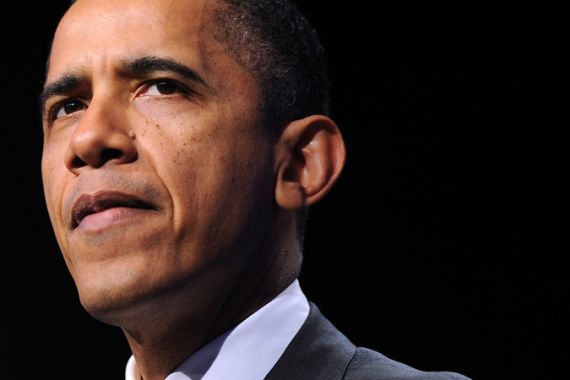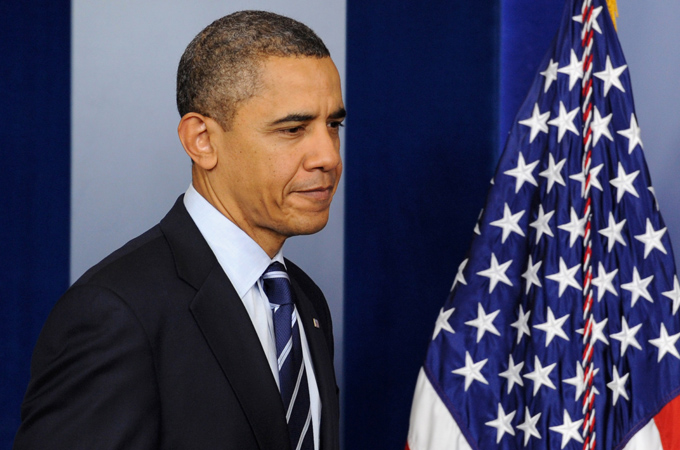US president signs Iran sanctions bill
The bill imposes sanctions on financial institutions dealing with Iran’s central bank.

 |
| The bill offers some flexibility for Obama in determining the strength and scope of the sanctions [Gallo/GETTY] |
US President Barack Obama has signed into law tough new sanctions against Iran’s central bank and financial sector, marking the sharpest economic confrontation between Washington and Tehran yet and potentially stoking tensions in the Gulf.
Saturday’s measures, meant to punish the Islamic Republic for its nuclear programme, were contained in a $662 billion defense bill, which officials said Obama signed despite concern it could complicate his bid to build an international front against Tehran.
The sanctions require foreign firms to make a choice between doing business with Tehran’s oil and financial sectors or central bank or the mighty US economy and financial sector.
Foreign central banks which deal with the Iranian central bank on oil transactions could also face similar restrictions under the new law, which has sparked fears of damage to US ties with nations like Russia and China.
Obama said in a statement issued as he signed the bill that he was concerned the measure would interfere with his constitutional authority to conduct foreign relations by tying his hands in dealings with foreign governments.
The bill, which passed with wide majorities in Congress, did reserve some wiggle room for Obama, granting him the power to grant 120 day waivers if he judges it to be in the national security interests of the United States.
Senior US officials said Washington was engaging with its foreign partners to ensure the sanctions can work without harming global energy markets, and stressed the US strategy for engaging with Iran was unchanged by the bill.
EU-Iran talks
Earlier on Saturday, a European Union foreign policy spokesman said the EU is open to meaningful talks with Iran provided there are no preconditions on the Iranian side.
|
|
EU will was in response to ambassador Ali Reza Sheikh Attar, who announced that Iran’s top nuclear negotiator, Saeed Jalili, is to send a letter soon to EU foreign policy chief Catherine Ashton to arrange a new round of negotiations over the country’s disputed nuclear programme.
EU foreign policy spokesman, Michael Mann, said in an email to the Reuters news agency that Catherine Ashton wrote to Jalili in October and had not yet had a response.
“We continue to pursue our twin-track approach and are open for meaningful discussions on confidence-building measures, without preconditions from the Iranian side,” he said.
Attar did not say when the letter would be sent. His comments were reported by the semi-official Mehr news agency on Saturday.
All talks between Iran and major powers, including the latest round in January in Istanbul, have failed so far to achieve any tangible result.
The main reason is that Iran has constantly rejected the key Western demand – suspension of its uranium enrichment plan as a sign of goodwill until the peaceful nature of the Iranian nuclear programmes are proven.
Missile tests
Iran plans to test-fire long range missiles during a naval exercise in the Gulf, following a threat by Tehran to close shipping lanes if the West imposes sanctions on its oil exports.
Mahmoud Mousavi, Iran’s senior navy commander, told English-language Press TV, “All kinds of surface-to-sea, sea-to-sea and surface-to-air, as well as shoulder-launched missiles, will be tested in the coming days”.
The semi-official Fars news agency, Press TV and the state-run IRNA news agency reported earlier on Saturday that Iran had already test-fired long-range and other missiles.
Tehran says the drill is aimed at showing Iran’s resolve to counter any attack by enemies such as Israel or the US, which have not ruled out a military option if diplomacy fails to resolve the nuclear dispute with Iran.
Stopping the oil flow
Tehran threatened on Tuesday to stop the flow of oil through the Strait of Hormuz in the Gulf if it became the target of an oil embargo over its nuclear ambitions, a move that could trigger military conflict with countries dependent on Gulf oil.
Iran’s oil minister said crude prices will rise to more than $200 per barrel if foreign sanctions are imposed on the country’s oil exports over its disputed nuclear work, the Aseman weekly reported on Saturday.
“Undoubtedly the price of crude will increase dramatically if sanctions are imposed on our oil … It will reach at least over $200 per barrel,” Rostam Qasemi said.